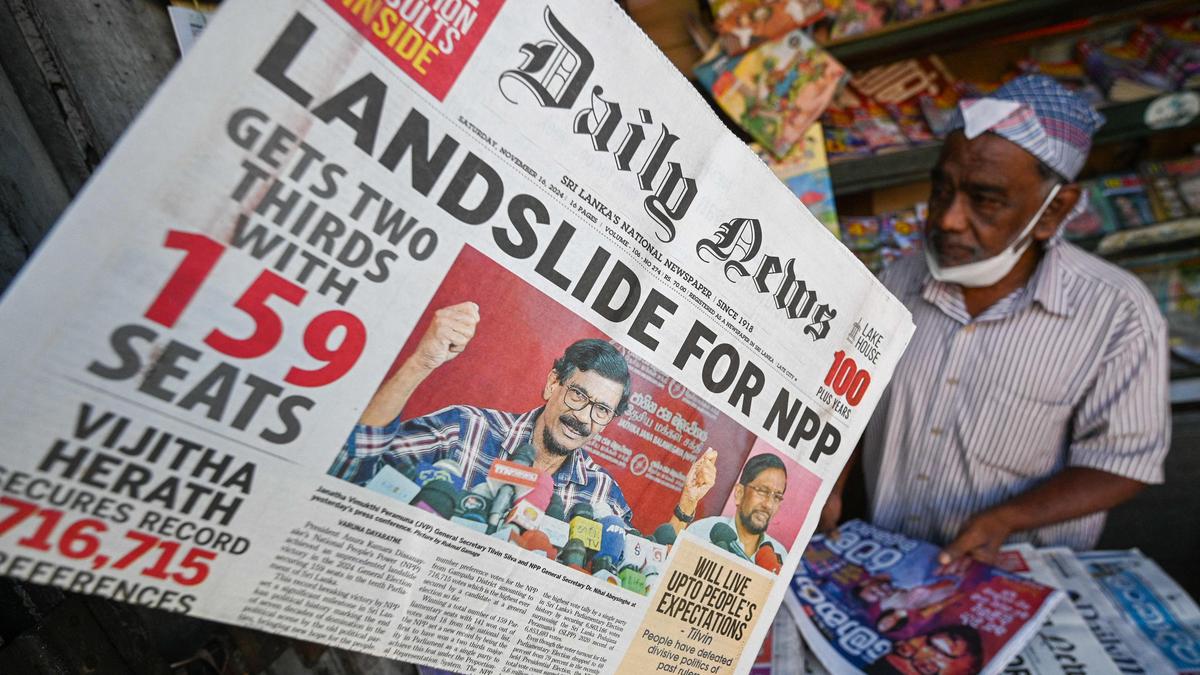
An overturning of Sri Lanka’s old political order Premium
The Hindu
The Sri Lankan parliamentary elections have, more or less, cleansed the 225-member Parliament, purging the country’s arrogant old guard
The National People’s Power (NPP), led by Sri Lanka’s President Anura Kumara Dissanayake, has swept the Sri Lankan parliamentary polls with an astounding majority.
The NPP’s success, built on Mr. Dissanayake’s win in September 2024 (the presidential election), was made possible by an astute reading of the ground sentiment, patient planning and execution of a smart election strategy. There is another side to this story: Sri Lanka is Asia’s oldest electoral democracy, with universal suffrage going back to 1931, and its citizenry, in an awesome political swing, have not only given the new government an overwhelming mandate but also clearly rejected the political status quo.
The elections have, more or less, cleansed the 225-member Parliament, purging the country’s arrogant old guard. While the NPP gained 159 seats (61.6% votes), the main Opposition Samagi Jana Balawegaya (SJB) was reduced to 40 seats (17.7% votes). The parties of former Presidents Ranil Wickremesinghe and the Rajapaksas have been crushed — five (4.5% votes) and three seats (3.1%), respectively. The Ilankai Tamil Arasu Katchi (ITAK) in the north and the east, which claims to be the main Tamil voice, was reduced to eight seats (2.3% votes), with similar electoral haemorrhage in the hill country for the candidates contesting from established regional and national parties. Significantly, three women from the hill country Tamil community have been elected. The new Parliament will look drastically different from the earlier stale house of pompous old men.
Sri Lanka’s worst economic crisis since Independence has led to unimaginable political changes. Like Humpty Dumpty, the old political order has had a mighty fall and cannot be put back together. Indeed, political parties, for decades, merely served the class interests of the elite in Colombo, the geopolitical stakes of powerful global actors, and the long distance nationalist agenda of the Tamil diaspora. The historic electoral shift radically alters the political terrain. It cannot be business as usual any more. Either the NPP has to deliver on peoples’ huge expectations, or risks being displaced by polarising right-wing forces.
This historic election is comparable to the one in 1977 during the decade-long global economic downturn. The right wing UNP government of J.R. Jayewardene came to power with a five-sixths majority in Parliament. J.R. Jayewardene, who was the Finance Minister at Independence in 1948, had waited for almost three decades to change the political and economic history of the country with a new Constitution, a presidential system and a liberalised economy.
Similarly, Mr. Dissanayake and the JVP have been waiting for three decades since taking the parliamentary path, after being decimated during their second brutal insurrection, to finally gain state power. The economic depression and the people’s mass struggles for system change over the last three years provided the perfect storm for their rise. Will they end majoritarian policies and finally abolish the authoritarian executive presidency? Will they rebuild an inclusive economy, and depart from the neoliberal project with tremendous inequalities?
The political wave towards the NPP had started even before the presidential elections, and a parliamentary majority was widely expected. However, the more surprising result was the unimaginable shift in the northern Tamil electorate.











